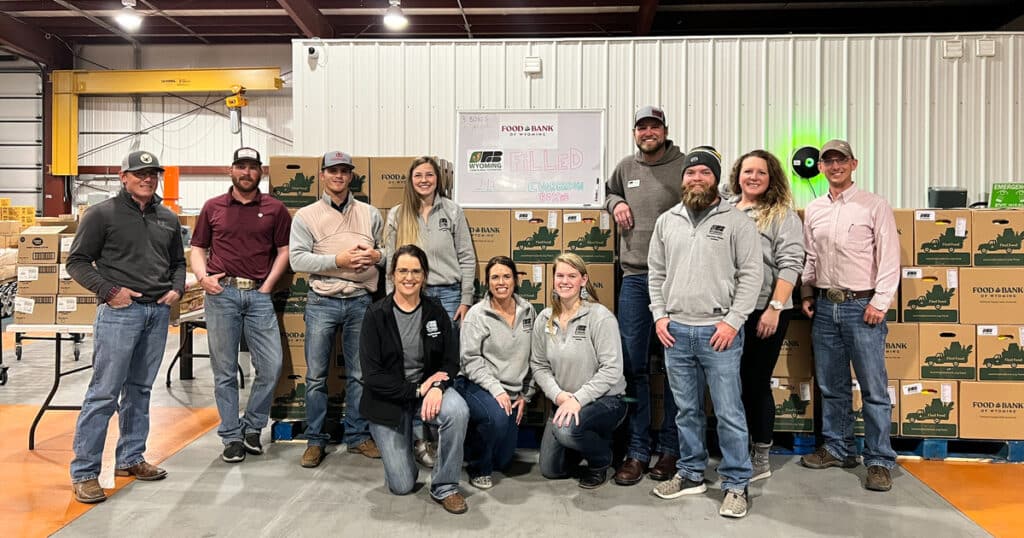
If you haven’t experienced the benefits of volunteering firsthand, think back to the last time that you did an important favor for a friend, or helped out a family member in a big way. It turns out that the warm feeling of satisfaction that you felt after aiding another person can actually be beneficial for your mental and physical health! Research has shown that there are numerous advantages of volunteerism for those who participate even semi-regularly, from health and wellbeing, to community interaction, skill and career building, and more.
Whether you’re volunteering with Food Bank of Wyoming or any other organization, here are some of the benefits of volunteering that you can expect.
Volunteering Is Good for Your Mental Health
That warm feeling of satisfaction that we described earlier has a scientific explanation rooted in your brain’s chemistry. A 2016 study by Sewanee: The University of the South shows that performing acts of kindness and altruism causes your brain to release more mood-enhancing chemicals like dopamine and endorphins, making you feel better in the process.
Apart from improved mood, some other mental health benefits of volunteering include stress relief and improved self-esteem. In the 2017 joint study ”Doing Good is Good for You,” researchers from UnitedHealthcare and VolunteerMatch surveyed nearly 3,000 adults across the United States about their volunteerism. Of those surveyed, 93% noted an improvement in mood, 79% reported lower stress levels, and 88% reported improved self-esteem. While “treating yourself” can be therapeutic as well, the science shows that performing acts of kindness — like volunteering at your local food bank — can have an even more pronounced effect on your mental health.
Volunteering Is Good for Your Physical Health, Too!
While it may feel like Golden Rule common sense that improved mental health is a benefit of volunteerism, you might be surprised to learn that volunteering can help improve your physical health as well.
In “Doing Good is Good for You,” researchers noted positive physical health outcomes from their volunteers: 75% reported that volunteering made them feel physically healthier and 78% reported that volunteering helped them feel more in control of their own health, including volunteers with chronic illnesses — 34% of whom reported that their volunteerism helped them better manage their illness.
Volunteering doesn’t have to be a workout, but it often involves some form of physical activity. For instance, many volunteer shifts with Food Bank of Wyoming involve light to moderate exercise, such as traversing our distribution center on foot or loading boxes of food onto trucks. Think of it like a trip to the gym, but with the added benefit of simultaneously helping nourish our communities!
This type of consistent physical activity can pay dividends for long-term health. In a 2013 study performed by Carnegie Mellon University, adults who had volunteered at least 200 hours in a year (a little less than two full days every month) were significantly less likely to develop hypertension-related health issues such as heart disease and stroke.
Volunteering Is Good for Your Career
There’s a reason that most businesses, from massive Fortune 500 corporations to small family enterprises, engage in some form of social justice work: Volunteering is good for your career!
Corporate volunteerism can be an excellent way to help employees bond and grow together as a team. By working toward a shared altruistic goal, employees can practice skills that they’ll later use in the workplace and have an opportunity to showcase the qualities that make them great to work with. We’ve seen it happen so many times at Food Bank of Wyoming — when companies take time to volunteer with us, they bond over the simple act of helping others together.
Here’s an added bonus: Volunteerism also looks great on your resume. According to the Deloitte Volunteer IMPACT Survey, 76% of human resources executives surveyed felt that volunteering made a job candidate more desirable, and 81% stated that skilled volunteering should be considered in hiring decisions. In another report, this time by the Corporation for National & Community Service, researchers found that candidates with volunteer experience were 27% more likely to find employment than their non-volunteering counterparts.
Volunteering Is Good for Your Community
The final and most important benefit of volunteering is also the simplest: Volunteering is important because it helps those in need. Regardless of which worthy cause you choose to devote your time to, your work will have a pronounced and positive impact on your community.
At Food Bank of Wyoming, our incredible volunteers power our ability to answer the challenge of hunger in our region. These dedicated people ensure that our 150+ Hunger Relief Partners are well-stocked with nourishing food and other necessities for our neighbors in need.
We’re confident that any one of those folks would tell you the same this: Volunteering is good for your health, your mind, your career, and your community! Consider joining us as a volunteer today.



